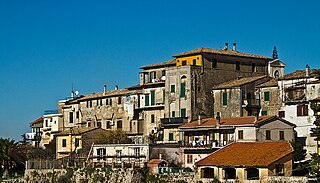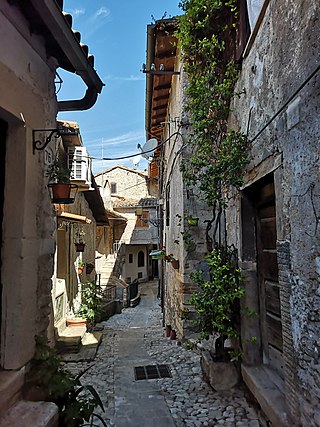
Olive oil is a liquid fat obtained by pressing whole olives, the fruit of Olea europaea, a traditional tree crop of the Mediterranean Basin, and extracting the oil.

Cantalupo in Sabina is a town and comune in the province of Rieti, on the Sabine Hills of Lazio. It is famous as the reputed origin of the melon called a cantaloupe melon.

Rieti is a town and comune in Lazio, central Italy, with a population of 47,700. It is the administrative seat of the province of Rieti and see of the diocese of Rieti, as well as the modern capital of the Sabina region.

Sabina, also called the Sabine Hills, is a region in central Italy. It is named after Sabina, the territory of the ancient Sabines, which was once bordered by Latium to the south, Picenum to the east, ancient Umbria to the north and Etruria to the west. It was separated from Umbria by the River Nar, today's Nera, and from Etruria by the River Tiber.

Collevecchio is a comune (municipality) in the province of Rieti in the Italian region of Latium.

Castel di Tora is a comune (municipality) in the Province of Rieti in the Italian region of Lazio, located about 50 kilometres (31 mi) northeast of Rome and about 20 kilometres (12 mi) southeast of Rieti.

Cottanello is a comune (municipality) in the Province of Rieti in the Italian region of Latium, located about 60 kilometres (37 mi) north of Rome and about 15 kilometres (9 mi) west of Rieti.

Fara in Sabina is a comune (municipality) in the Province of Rieti in the Italian region of Lazio, located about 40 kilometres (25 mi) northeast of Rome and about 25 kilometres (16 mi) southwest of Rieti.

Magliano Sabina is a comune (municipality) in the Province of Rieti in the Italian region of Latium, located about 50 kilometres (31 mi) north of Rome and about 30 kilometres (19 mi) west of Rieti. As of 31 December 2004, it had a population of 3,829 and an area of 43.7 square kilometres (16.9 sq mi).

Montopoli di Sabina is a town and comune (municipality) in the Province of Rieti in the Italian region of Latium, located about 40 kilometres (25 mi) northeast of Rome and about 20 kilometres (12 mi) southwest of Rieti. In 2011, it had a population of 4,222.

Poggio Catino is a comune (municipality) in the Province of Rieti in the Italian region of Latium, located about 45 kilometres (28 mi) northeast of Rome and about 20 kilometres (12 mi) southwest of Rieti. As of 31 December 2011, it had a population of 1,335 and an area of 15.0 square kilometres (5.8 sq mi).

Poggio Mirteto is a comune (municipality) is situated in the Tiber Valley Central Italian region of Latium. Administratively Poggio Mirteto is in the province of Rieti and geographically this municipality is about 45 kilometres (28 mi) northeast of Rome and about 20 kilometres (12 mi) southwest of Rieti.

Poggio Moiano is a comune (municipality) in the Province of Rieti in the Italian region of Latium, located about 45 kilometres (28 mi) northeast of Rome and about 20 kilometres (12 mi) south of Rieti.
Poggio Nativo is a comune (municipality) in the Province of Rieti in the Italian region of Latium, located about 45 kilometres (28 mi) northeast of Rome and about 20 kilometres (12 mi) southwest of Rieti.
Poggio San Lorenzo is a comune (municipality) in the Province of Rieti in the Italian region of Latium, located about 50 kilometres (31 mi) northeast of Rome and about 15 kilometres (9 mi) south of Rieti.

Torricella in Sabina is a comune (municipality) in the Province of Rieti in the Italian region of Latium, located about 50 kilometres (31 mi) northeast of Rome and about 15 kilometres (9 mi) south of Rieti.

Passo Corese is an Italian town and hamlet (frazione) of Fara in Sabina, a municipality in the province of Rieti, Lazio. In 2011 it had a population of 3,573.
Aprutino pescarese PDO is a Protected Designation of Origin (PDO) olive oil, produced in the province of Pescara, in the regions of Abruzzo. It is among the first group of Italian extra virgin olive oils to gain the PDO.

The FL1 is a regional rail route forming part of the Lazio regional railways network, which is operated by Trenitalia, and converges on the city of Rome, Italy.

The extra-virgin olive oil Terre Tarentine is produced with the olive cultivars Leccino and Coratina and Ogliarola for, at least, 80%. They are mixed with other minor varieties of the local olive groves. It is recognised as PDO product.
















